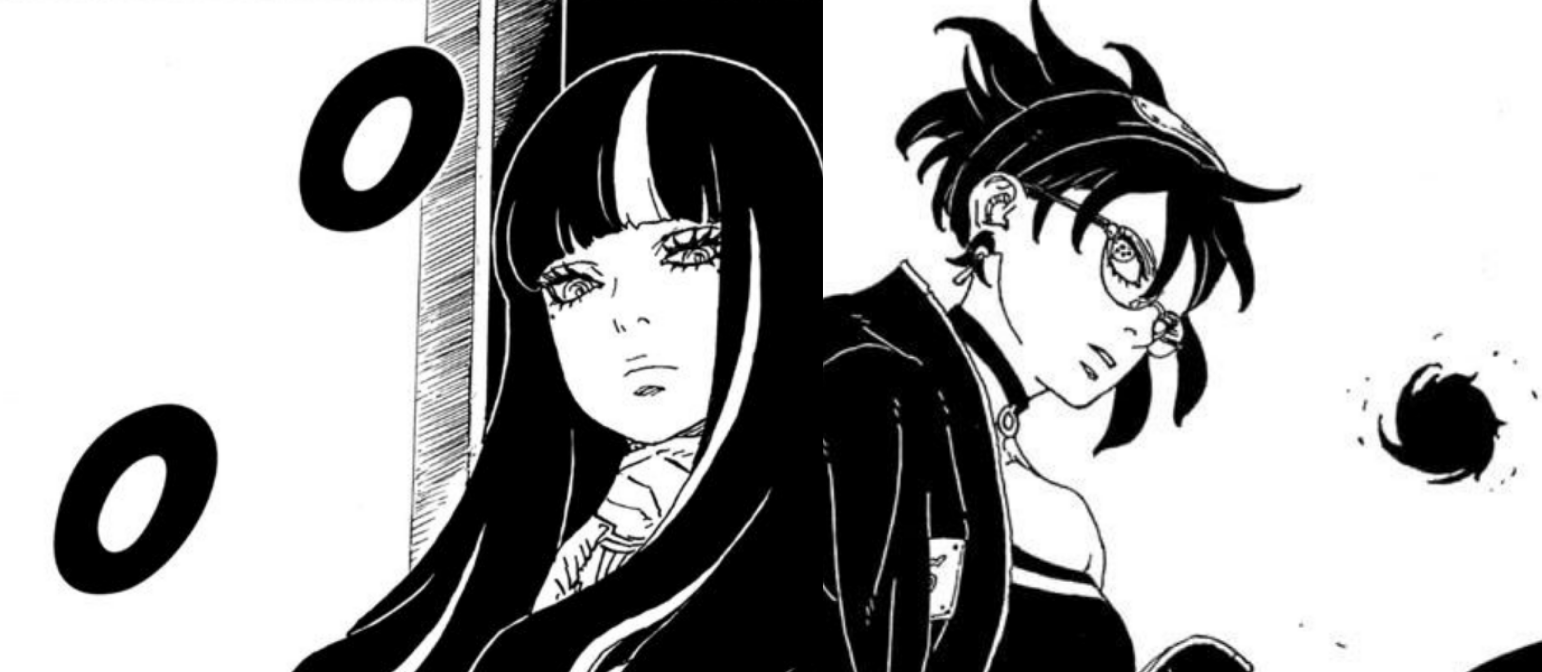Captivation and Gravitation: Forces of Fundamental Attraction
Gravity is the force of fundamental attraction between all things that have mass or energy.

When Eida's character is introduced at the beginning of the Code Arc, we learn that not only does she have the all-seeing Senrigan, but she also possess a captivation effect, the ability to charm all those who see her, capturing their hearts and preventing them from harming her. On a surface level, this seems to have very little to do with the right-eye Mangekyo Sharingan (MS) ability Sarada manifested in chapter 21 of Boruto: Two Blue Vortex (TBV). However, at the center of both powers is the undeniable strength of attraction.
Gravity is one of the four universal fundamental forces, the attraction that draws one object with mass towards another. While being the weakest of these four force, we owe the rotation of planets around stars to gravity as well as the spinning of our Earth, the existence of our moon, and the weight of our feet on the ground beneath us. It's the binding substance of our universe.
The Boruto series is no stranger to gravitational analogies. Throughout the anime academy arcs, Boruto is referred to as the nucleus of his class and Mitsuki goes as far as to ask Inojin why everyone gravitates to him. In the manga, we see Naruto describing chakra as a binding force that links humans together, connecting Naruto to Kawaki, Himawari to Hinata, and Boruto to Sarada.


Naruto tells Kawaki that chakra is a binding force.
For Sarada, her power of attraction manifests as an aspect of physics, manipulating the mechanics of gravity and bending them to her will. In contrast, Eida's captivation effect is a psychological one that affects the minds of those who see her, creating an instantaneous pull of other people towards her. Just as Sarada can use gravity to protect herself, the captivation also prevents others from harming Eida.
"Pick What It Applies To"
When Mitsuki analyzes Sarada's MS in action, he theories that "...the sphere is exerting gravitational pull, but only upon Ryu, the iron sand, and Sarada herself. It isn't affecting you, me, or any of the natural objects around us. She's able to pick what it applies to."
Not only is Sarada able to control gravity, she exerts control over it through a series of spheres, some that pull matter into them, others that appear to have mass. The spheres themselves are what seems to exert the gravitational influence, creating a zone of influence between them that applies to objects and beings of Sarada's choosing. Essentially, when her MS ability is active, she has power over other beings and herself.
Unlike Sarada, Eida isn't in control of her powers. Created by a wish brought to life though Shinjutsu, her captivation effects all who aren't immune to Omnipotence. Though powerful, Eida expresses that this ability manifests for her as a loss of agency. She's unable to be liked or loved for who she truly is, unable to have friends, unable to be honestly wooed by a romantic prospect. Instead of defining her zone of influence, it applies automatically to all who see her, stripping her of her ability to form authentic connections with other people.
Averted Gaze vs All Seeing
Code terms Eida, "You who knows everything in this world." With her Senrigan, Eida can see all events currently occurring and all past events that happened in her life time. It's with her all-seeing eyes that she witnesses Kawaki kill Isshiki, and her heart flutters. The connection she has with Kawaki comes from her ability to see him, to watch him, to feel love for him despite having never met him.
Sarada's connection to Boruto is reversed. She's known him since birth, raised in the same village together, trained at the same academy, part of the same team. She has every reason to feel attraction to him, yet the moment she does, she averts her gaze because she fears being distracted from her greater goals. She dismisses the romantic intentions of others, including Eida, thinking "This girl. Is this really all she thinks about? It's almost kinda stupid..." when Eida asks to discuss love with Sarada and Sumire.
This highlights one of the main differences between Sarada and Eida, though: acknowledgement vs suppression. Eida feels attraction to Kawaki, but she can't define why. She describes it in terms of physical sensation, sharing her feelings for him with all those around her. This is exactly the inverse of how Sarada's attraction to Boruto manifests. She suppresses her feelings, both to herself and when others probe her emotions. We see her care come out in her actions, but she fails to recognize the source of her behavior.
To Love or to Be Loved
As Naruto says to Kawaki, Sarada and Boruto are bound together. Whether you read their dynamic as romantic or aromantic, they have a deep, enduring bond. Even when she's not acknowledging her emotions, Sarada acts out of love for him. Her desire is for his safety, his presence, his return to Konoha. This is not because she wants to be loved in return or desires romance.
Eida's pursuit of Kawaki is predicated on her desire to be loved by him, one of the two non-related males on the planet able to choose her of their own volition. While her heart flutters at the thought of him, it's his potential to return her love that makes him the object of her desire. We don't know if she would have targeted Kawaki as a romantic partner had she had her pick of anyone on the planet. Though she expresses care for him, it's clear that what she wants is to be loved in return.
Powerlessness
Returning to chapter 79 and 80 of Boruto: Naruto Next Generations (NNG), both Sarada and Eida manifested powers in the face of powerlessness. In chapter 79, Eida sought out Kawaki while Konoha was hunting him, wanting to protect him with her presence. Kawaki broke down in front of Eida, expressing his own futility to protect Naruto and the village from Momoshiki inside of Boruto. His internal dialogue is that he's garbage, trash, meaningless, and demands that Eida look at him to see how worthless he really is.
That moment between Eida and Kawaki activates Omnipotence, her desire to help Kawaki resulting in her powers being a conduit to his wish coming true, swapping the role of himself and Boruto in the minds of everyone. Eida's power is activated through her moon-shaped eyes, bringing back Momoshiki's line, "those blue eyes shall take everything from you."
In the next chapter, after Boruto and Kawaki's places have been swapped, Sarada realizes that everyone now sees Boruto as they saw Kawaki, a rebellious traitor who tried to kill the Hokage's son and murdered Naruto and Hinata. Boruto is essentially in the same place Kawaki was in the previous chapter, alone in the woods being hunted by their former friends. Like Eida, Sarada feels powerless to help Boruto at his lowest. The pain of being able to do nothing to stop the tragedies that have befallen him leads her to awakening her sun-patterned MS for the first time as she pleads with Sasuke to help him, providing her father with all the evidence he needs to save the student he's already forgotten.
Conclusions: Moon and Sun
Boruto is rife with analogies regarding celestial bodies, but here's yet another one: We know that ninjutsu are, in Sarada's own words, "nothing more than a pale imitation of these Shinjutsu," and, thus, the Ninjutsu abilities wielded by Sarada should be less potent than Eida's powers. Yet, the symbolism in their eyes suggests that Sarada's MS holds the true light of the sun while Eida's crescent moon simply reflects the brilliance of that light.
With Sarada's Orihime ability twinning Eida's captivation (one of the two active effects of Omnipotence), there's a chance that whatever power she manifests in her left eye will have the ability to counter the belief that Kawaki is Naruto's son and Boruto is nothing but a murderous outsider. As Eida told Sarada in chapter 1 of TBV, "It'd be more practical to just rewrite different memories," after which she ominously adds, "Though there's risk in that, too."
